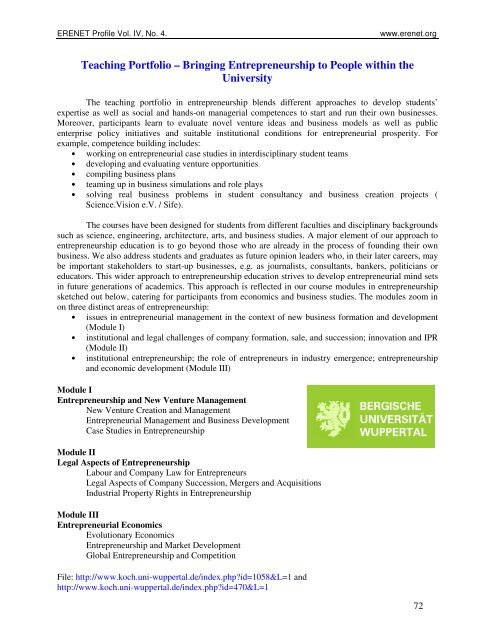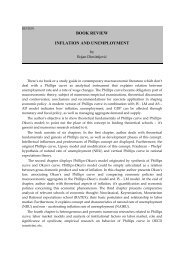Issue 16
Issue 16
Issue 16
You also want an ePaper? Increase the reach of your titles
YUMPU automatically turns print PDFs into web optimized ePapers that Google loves.
ERENET Profile Vol. IV, No. 4.<br />
www.erenet.org<br />
Teaching Portfolio – Bringing Entrepreneurship to People within the<br />
University<br />
The teaching portfolio in entrepreneurship blends different approaches to develop students’<br />
expertise as well as social and hands-on managerial competences to start and run their own businesses.<br />
Moreover, participants learn to evaluate novel venture ideas and business models as well as public<br />
enterprise policy initiatives and suitable institutional conditions for entrepreneurial prosperity. For<br />
example, competence building includes:<br />
• working on entrepreneurial case studies in interdisciplinary student teams<br />
• developing and evaluating venture opportunities<br />
• compiling business plans<br />
• teaming up in business simulations and role plays<br />
• solving real business problems in student consultancy and business creation projects (<br />
Science.Vision e.V. / Sife).<br />
The courses have been designed for students from different faculties and disciplinary backgrounds<br />
such as science, engineering, architecture, arts, and business studies. A major element of our approach to<br />
entrepreneurship education is to go beyond those who are already in the process of founding their own<br />
business. We also address students and graduates as future opinion leaders who, in their later careers, may<br />
be important stakeholders to start-up businesses, e.g. as journalists, consultants, bankers, politicians or<br />
educators. This wider approach to entrepreneurship education strives to develop entrepreneurial mind sets<br />
in future generations of academics. This approach is reflected in our course modules in entrepreneurship<br />
sketched out below, catering for participants from economics and business studies. The modules zoom in<br />
on three distinct areas of entrepreneurship:<br />
• issues in entrepreneurial management in the context of new business formation and development<br />
(Module I)<br />
• institutional and legal challenges of company formation, sale, and succession; innovation and IPR<br />
(Module II)<br />
• institutional entrepreneurship; the role of entrepreneurs in industry emergence; entrepreneurship<br />
and economic development (Module III)<br />
Module I<br />
Entrepreneurship and New Venture Management<br />
New Venture Creation and Management<br />
Entrepreneurial Management and Business Development<br />
Case Studies in Entrepreneurship<br />
Module II<br />
Legal Aspects of Entrepreneurship<br />
Labour and Company Law for Entrepreneurs<br />
Legal Aspects of Company Succession, Mergers and Acquisitions<br />
Industrial Property Rights in Entrepreneurship<br />
Module III<br />
Entrepreneurial Economics<br />
Evolutionary Economics<br />
Entrepreneurship and Market Development<br />
Global Entrepreneurship and Competition<br />
File: http://www.koch.uni-wuppertal.de/index.php?id=1058&L=1 and<br />
http://www.koch.uni-wuppertal.de/index.php?id=470&L=1<br />
72
















